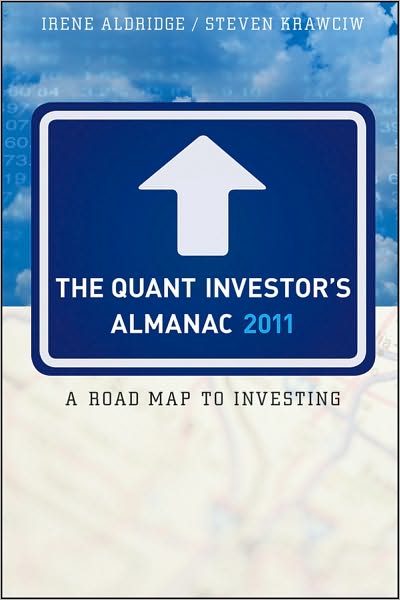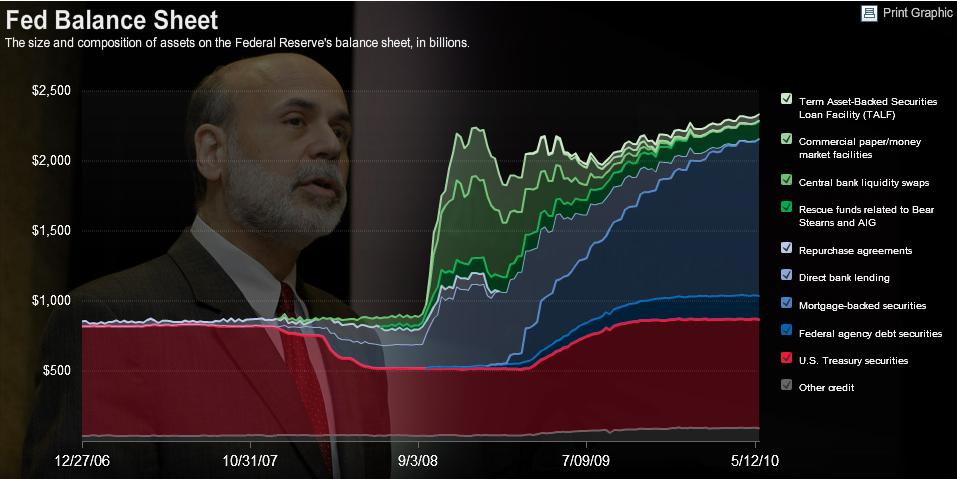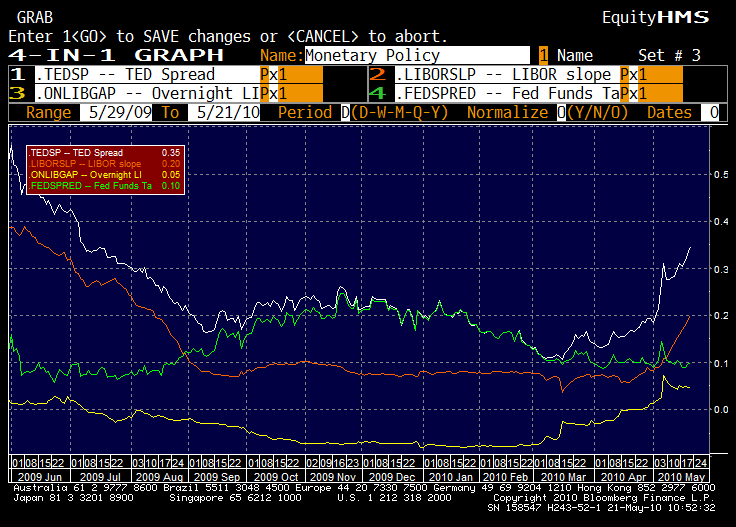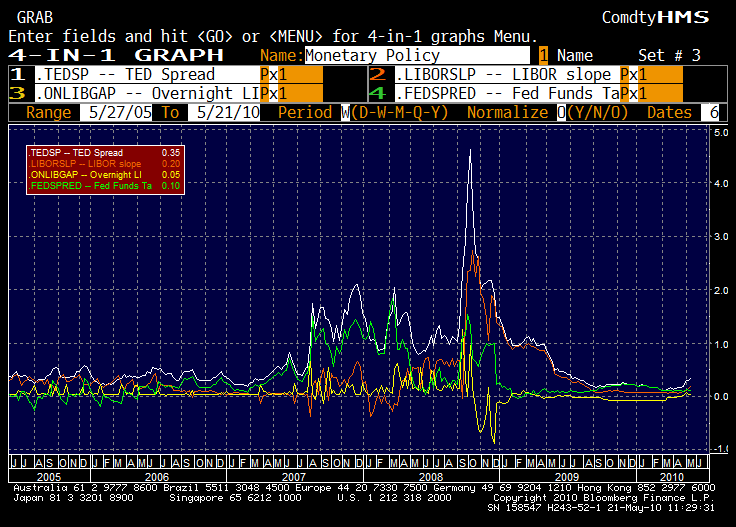In my last post on this topic, I went over the orthodox and unorthodox monetary policy responses to the crisis in the US.? Here were the orthodox options:
- Lower the Fed funds rate into lower positive territory.
- Offer language that says that the Fed Funds rate will be low for a long time.
- Buy more long-dated Treasury bonds.
And the unorthodox options:
- Lend directly to classes of private borrowers.
- Create negative interest rates for Fed funds.
- Debase the currency by expiration dates, lotteries, etc.
On orthodox policy: I’m not sure there is that much difference between Fed funds at 0.25% and 0.10%, except that money market funds will find themselves in further trouble, as yields are too low to credit anything. That the Fed will be on hold for a long time seems to be the default view of the market already, so an explicit declaration would likely prove superfluous.? On buying long-dated Treasury bonds, that will benefit the US Government by pseudo-monetizing the debt, but won’t help the real economy much.
Yes, some high-quality corporate and mortgage bond rates will be pulled down with it, but so will discount rates for liabilities.? The same applies to spending rules for endowments, and how much retirees can get if they go to buy an annuity.? The effects of QE are mixed at best, and on balance, might be depressing, not stimulating.? But what practical proof, if any, do we have that QE has ever worked?
We need policymakers to understand the bankruptcy of the theories they are working with.? So many macroeconomic models work with one interest rate.? But in the real world there are many rates, and duration and quality of lending make a huge difference in what rate is charged.? I would urge that every person who would be on the FOMC work at a buyside firm managing bonds and money market instruments.? Let them see how the markets really work, and it might disabuse them of their false neoclassical views of how the lending markets work.? Better still, if their P&L is less than the cost of capital, revoke their appointment.? It’s time to kick out the academics, with their failed ideologies, and let those who have worked in the markets successfully manage the economy.
Direct Lending
But then there are the unorthodox methods.? When Social Security came into existence, they argued over where the money would be invested.? It was decided that the only fair investment was in government bonds, because it was neutral.? Investing in other assets, like the S&P 500 would be unfair, because they would be favoring a sector of the economy.
The same argument applies to direct lending by the Fed, because it would smack of favoritism.?? Going back to my last article, favoritism undermines confidence in the system, and makes people less willing to invest unless the government gives them an edge — cash for clunkers, $8,000 tax credit, etc.? We are Americans, after all.? Why buy from the retailer now, when you know that there will be another sale coming soon?? Economic policymakers should not rely on people to behave “as usual” when policy becomes unpredictable and unfair to the average person.
So I don’t see direct lending by the Fed, or buying high yield bonds, or offering protection on baskets of bonds as wise moves.? It may temporarily goose an area for a time, and make an area of the economy QE-dependent, or stimulus-dependent, but at best it is helping a few, while discouraging the rest.
Negative Fed Funds
I’ve been thinking about negative rates for Fed funds, and I think that they will have the following effects:
- Banks will drop their excess reserves at the Fed to zero, and vault cash (or its short-term debt equivalents) will increase.
- Banks will try to borrow from the Fed at negative interest rates, if they allow it, and just sit on the cash, park it in T-bills, Top-top CP — it’s free money, after all.? Of course, some point free money may be construed as valueless money, but that is another thing.
Required reserves are not a large percentage of liabilities.? Unless Fed funds goes deeply negative, it’s not going to affect bank profitability that much.? Banks may just view it as a cost of doing business, and pass it on to customers.
Destructive Creative Currency Debasement
With apologies to Schumpeter, who popularized the concept of creative destruction, I’ll try to define a new concept that is the opposite — destructive creativity.? Destructive creativity is when bureaucrats or regulators get too clever, and in an attempt to solve a lesser problem, end up creating a bigger problem.
I’ve heard proposals for further debasement of the currency via placing expiration dates on currency, or randomly canceling currency through lotteries based on the serial numbers on the bills.? The idea is that people will change their behavior: save less and spend more.
I can’t say that I can see every unintended consequence with these proposals, but according to Keynes, Lenin said, “The best way to destroy the capitalist system is to debauch the currency.”? These creative means of debasing the currency might do it.
Who gets to be the one holding the Old Maid card as expiry draws near.? How much time would be wasted scanning currency at registers as money is handed over and change is handed out?? Is the money cancelled or expired?? Close to expiration?? Quick, put it into the pile to give as change to the next customer.? There may be legal tender laws, but I can tell you that there would be fights over things like this.? Would all of the dollar bills used as a shadow currency overseas come trotting home?
If the Fed wanted to write its own death warrant, it should implement schemes like these.? The Fed is already viewed with enough skepticism by average people, that it wouldn’t take much to tip the scale from “Audit the Fed,” to “End the Fed,” where it gets replaced with the currency board tied to a commodity standard.
This leaves aside ideas like expiring/canceling a certain amount of monies in savings or checking accounts.? After all, why stop with the paper money?? Move onto the blips that we transfer day after day, silently, quietly choking the economic well-being of people, making them feel less safe, less secure, more paranoid.? Would we set up checking/savings accounts in other currencies to avoid this trouble?? Would that even work, such that we would have to set them up in foreign countries, and access funds that way?? What’s that you say?? Exchange controls?? Destructive creation indeed.? To “solve” a smaller problem, a dud economy, create a much larger problem…
Want to kill the economy/country?? Taxation is one thing, confiscation is another.? There are more than enough people who have question marks in their heads over what the government is doing with monetary policy and stimulus.? Aggressive actions to debase the currency can turn those question marks in to exclamation points.
This has gone longer than I thought.? Time to hit publish, and I will finish this tonight.





